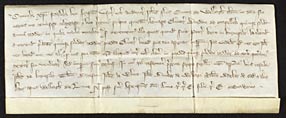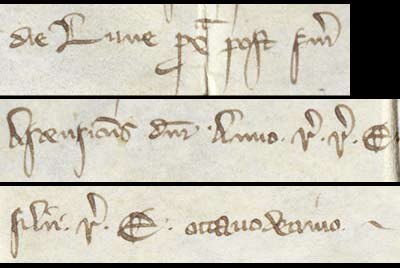Dating by Religious Feast Day
Between the 13th and 15th centuries it was very common for documents to be dated by reference to the day of the week and to a nearby religious feast date. Thus a document might be dated 'The Wednesday before the feast of St Peter and St Paul 5 Henry VII'. Dates set out in this format simply have to be decoded, stage by stage.
This deed provides an illustration of dating according to a feast day. The Latin quitclaim from John de Wellow to Oliver Burdon is dated 'the Monday next after the feast of the Lord's Ascension, in the 18th year of the reign of King Edward, son of King Edward'. This must have been King Edward II; there would have been some further distinction given if the deed had referred to King Edward III.

Quitclaim, 1325 (Ne D 2002), with detail below

Transcript:
die Lune p[ro]x[imus] post f[estu]m
Ascaensio[n]is d[omi]ni Anno r[egni] r[egis] E[dwardi]
filie r[egni] E[dwardi] octavo decimo
The first stage in the process is to find the date of the religious feast day in question. Again, Cheyney's Handbook of Dates will assist with this - see the list of further reading. Reference to a list of saints' days indicates that the feast of the Ascension falls on 'The Thursday following Rogation Sunday'. Rogation Sunday is the 5th Sunday after Easter Day.
In order to be able to work out the date, therefore, we need to know when Easter fell in the second year of Edward II. The regnal year 18 Edward II ran from the 8th of July 1324 to the 7th of July 1325. Therefore Easter of that regnal year fell in 1325.
By looking at a calendar for 1325, we can see that Easter Day fell on the 7th of April. This means that Rogation Sunday, being the 5th Sunday after Easter, fell on the 12th of May. Ascension is the following Thursday, namely the 16th of May. Our document was dated on the Monday following Ascension, or the Monday following the 16th of May. Our document, therefore, is dated the 20th of May 1325.
The four 'quarter days' on which rents were traditionally paid in England were all based on religious feasts:
- Lady Day, or the feast of the Annunciation (25 March)
- Midsummer Day, the feast of St. John the Baptist (24 June)
- Michaelmas, the feast of St. Michael and All Angels (29 September)
- Christmas Day, the feast of the Nativity (25 December).
Next page: Julian/Gregorian Calendars